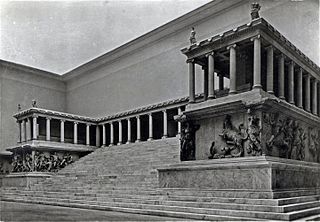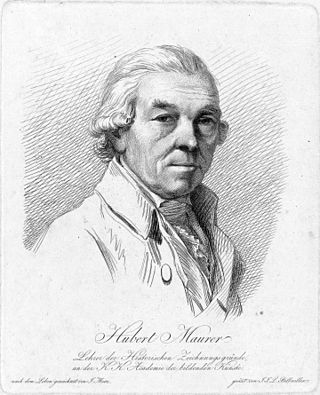Related Research Articles

Johann Joachim Winckelmann was a German art historian and archaeologist. He was a pioneering Hellenist who first articulated the differences between Greek, Greco-Roman and Roman art. "The prophet and founding hero of modern archaeology", Winckelmann was one of the founders of scientific archaeology and first applied the categories of style on a large, systematic basis to the history of art. Many consider him the father of the discipline of art history. He was one of the first to separate Greek Art into periods, and time classifications.

The Hanseatic City of Stendal is a town in Saxony-Anhalt, Germany. It is the capital of the Stendal District and the unofficial capital of the Altmark region.

Ferdinand Tönnies was a German sociologist, economist, and philosopher. He was a significant contributor to sociological theory and field studies, best known for distinguishing between two types of social groups, Gemeinschaft and Gesellschaft. He co-founded the German Sociological Association together with Max Weber and Georg Simmel and many other founders. He was president of the society from 1909 to 1933, after which he was ousted for having criticized the Nazis. Tönnies was regarded as the first proper German sociologist and published over 900 works, contributing to many areas of sociology and philosophy. Tönnies, Max Weber, and Georg Simmel are considered the founding fathers of classical German sociology. Though there has been a resurgence of interest in Weber and Simmel, Tönnies has not drawn as much attention.

Max Theodor Felix von Laue was a German physicist who received the Nobel Prize in Physics in 1914 for his discovery of the diffraction of X-rays by crystals.

Claudio Magris is an Italian scholar, translator and writer. He was a senator for Friuli-Venezia Giulia from 1994 to 1996.

The Pergamon Altar was a monumental construction built during the reign of the Ancient Greek King Eumenes II in the first half of the 2nd century BC on one of the terraces of the acropolis of Pergamon in Asia Minor.

Mark Lammert, is a German painter, illustrator, graphic artist and stage designer. He lives and works in Berlin.

Hubert Maurer was a German painter, graphic artist and art professor.

Horst Bredekamp is a German art historian and visual historian.
Stefan Lehmann is a German classical archaeologist.
Elisabeth Rohde was a German classical archaeologist.
Albert Joseph Maria Defant was an Austrian meteorologist, oceanographer and climatologist. He published fundamental works on the physics of the atmosphere and ocean and is regarded as one of the founders of physical oceanography.
Max Ebert was a German prehistorian known for his studies associated with the Baltic states and South Russia.
Wolfram Steinbeck is a German musicologist.
Norbert Miller is a German scholar of literature and art. He was professor of literary studies at the Technische Universität Berlin from 1973 and retired in 2006.
Peter Betthausen is a German art historian.
Manuela Schwartz is a German musicologist.

Edith Schönert-Geiß was a German numismatist, who specialised in the classical coinage of Thrace and was instrumental in the post-war re-establishment of the Corpus Nummorum.
Konrad Sasse was a German musicologist and Handel scholar.
Élisabeth Décultot is a French Germanist, art historian and literary scholar. Since February 2015 she has held an Alexander von Humboldt Professorship at the Martin Luther University of Halle-Wittenberg. Since September 2020 she has been managing director of the Interdisciplinary Center for Research on the European Enlightenment
References
- ↑ Helden auf dem Prüfstand Der Spiegel
- ↑ Professorenstreit: Lehmann rudert zurück, Volksstimme.de 20 February 2012 (accessed 31 December 2017).